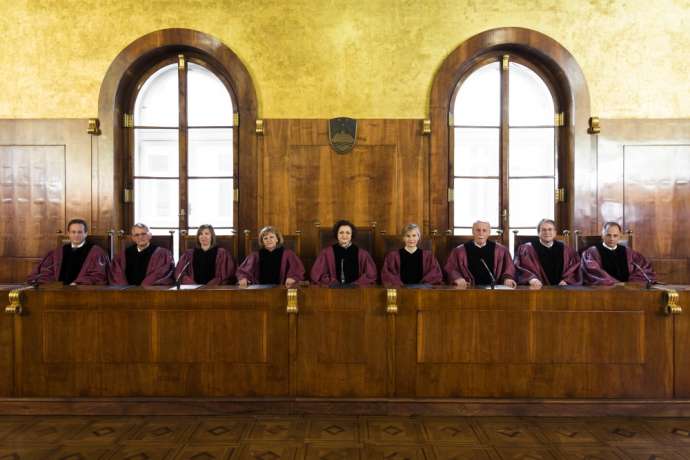STA, 14 October 2019 - The Constitutional Court has annulled part of the controversial amendments passed in January 2017 that define a special temporary regime on the border in the event of mass migration.
The Court annulled sections of clause 10.b which would effectively allow the country to suspend asylum law in special circumstances that would have to be endorsed by absolute majority in parliament.
The special system, imposed for a six-month period with the possibility of extension in a pre-defined area, would involve refusal to admit foreigners who do not meet entry criteria and the expulsion of those who have already entered the country unlawfully.
If they expressed the intention of asking for asylum, requests would be rejected by police as unfounded unless there were systemic shortcomings with regard to asylum in the EU country from which such a person entered.
Such systemic shortcomings would include the risk of torture, inhumane or degrading behaviour.
The amendments were passed despite concerns raised by NGOs, the Council of Europe and the UN High Commissioner for Refugees that they were in breach of international treaties.
Due to the concerns, the amendment was challenged at the top court by the human rights ombudsman in April 2017.
The Constitutional Court announced on Monday that it several sections of clause 10.b violated the Article 18 of the Constitution, which guarantees the principle of non-refoulement.
Clause 10.b does not guarantee, neither in Slovenia nor a neighbouring EU member, access to fair and effective legal procedure that would guarantee a substantive assessment that refoulement could not put the person in jeopardy of non-humane and degrading treatment.
A country may return an individual to a third country only if the third country is deemed safe; however, trust between countries should not be absolute. The person requesting asylum must get the opportunity to challenge the presumption of safety in this country.
Moreover, the contentious clauses also narrow the number of reasons that can be cited by those who are challenging the assumed safety of the neighbouring EU member state, the court said.
Also, the rejection of intention to request for asylum by one country does not obligate the neighbouring EU member state to accept this person, the court said.
The decision was adopted with eight votes in favour and one against, with judge Klemen Jaklič also issuing a dissenting opinion. In it he said that he had been subjected to "unacceptable" pressure due to his dissenting position in this case.
The Interior Ministry, which had drafted the 2017 changes to the foreigners act, said it would respect the Constitutional Court decision. Vesna Györkös Žnidar, the then interior minister, has not commented on the decision.
The Human Rights Ombudsman Peter Svetina, who challenged the changes in Constitutional Court, is happy with the decision. He sees the decision as a "welcome confirmation of constitutional and convention standards ... Being a country government by the rule of law, we cannot just bypass them when this may seem convenient".
Most political parties meanwhile seem reluctant to comment on the decision. The opposition Left labelled the decision on the "obnoxious" legislative changes made by the Miro Cerar government as appropriate.
The party moreover said that this alone would not suffice, as reports suggested that migrants were being returned and prevented from requesting asylum also without the contentious changes in force.
Also happy was MEP Milan Brglez, former parliamentary speaker and a former MP for the then senior coalition Modern Centre Party (SMC). He was one of several coalition MPs who voted against the changes in January 2017.
While Karl Erjavec, the president of the coalition Pensioners' Party (DeSUS), said he could not yet comment because he had not read the decision yet, Zmago Jelinčič, the leader of the opposition National Party (SNS) said that the Constitutional Court should first and foremost protect the Slovenian state and its citizens.
Democrats (SDS) head Janez Janša tweeted that "the left majority" at the Constitutional Court "abolished the safeguard in the foreigners act at a time when we are in danger of a refugee wave once more due to the Turks. There is no end to betrayal and anti-Slovenian policy of the leftists."






